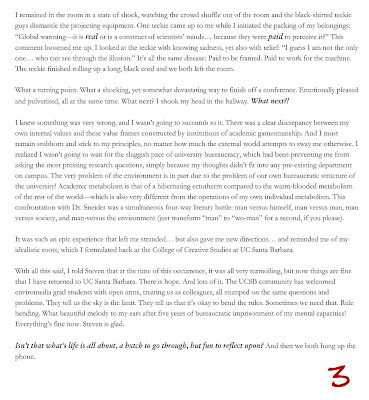 Telling Life Stories Syllabus from Dr. Caroline Allen. College of Creative Studies, UC Santa Barbara.
Telling Life Stories Syllabus from Dr. Caroline Allen. College of Creative Studies, UC Santa Barbara.  Overview of the course. Vic's response to the course on the first day. PDF file of the above sheet: http://stokastika2.googlepages.com/3.responsetoclassonfirstday.pdf.
Overview of the course. Vic's response to the course on the first day. PDF file of the above sheet: http://stokastika2.googlepages.com/3.responsetoclassonfirstday.pdf.  An Internal Turning Point in My Life. Page 1.
An Internal Turning Point in My Life. Page 1.  An Internal Turning Point in My Life. Page 2.
An Internal Turning Point in My Life. Page 2.  An Internal Turning Point in My Life. Page 3.
An Internal Turning Point in My Life. Page 3. PDF file of the short story:
It is essential in my life. Prompt journal writing is "me time." The premise of this course is fundamentally simple. You are in a class with 12-15 other brilliant writers (most of younger age than I am) and you have 12 minutes to write a prompt on a certain topic. You share what you wrote to the class and the class responds in terms of (1) what intrigued you about the story (2) what more do you want to here. The structure of the course is brilliant because with writing, and with many other projects, "the hardest part is always starting, but once you're going you keep on rolling." The starting part is most difficult, and it urges one and several people to finish stuff. Every single student in the class is such a wealth of ideas! The other amazing policy of the class is to be (1) hands off psychologists (2) keep the stories inside the class. People are telling VERY personal stories and it's very important not to impose your views on them in terms of what is right or wrong or what to do with your life. There are some very clever students in the course, for such a young age! And it makes complete sense why they are CCS literature majors.
For example, today, there is an African-American girl who wrote with an amazing voice--snarky, non-chalant. She cares, but she doesn't care. And it was all with an attitude. Saying things that you don't really expect one to say. There are some beautiful phrases and terms emerging from these students' mouthes. At first I was like, great, I am surrounded by a bunch of young people. What do they have to say for themselves? And my gosh. They have so much to say, and they have little jewels here and there I can most certainly learn from. This class gives me hope for he next generation of Millenials. Contrary to the media and research' portrayal of the opposite: a generation of deterioration and decay of society.


















